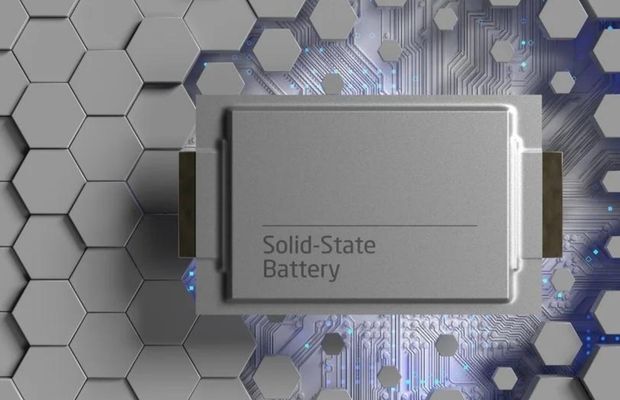Solid-state batteries are gaining interest as they offer several benefits compared to conventional lithium-ion batteries, including higher safety, energy density, and lower environmental impact. While the technology is still new, various car manufacturers, such as Nissan, BMW, and Volkswagen, have invested in research and development towards the commercial viability of solid-state batteries. NASA researchers and US researchers at the Illinois Institute of Technology and the US Department of Energy’s Argonne National Laboratory are also making progress in improving battery technology through investigating the use of solid-state batteries. The higher performance data of solid-state batteries from QuantumScape also made them more likely to replace conventional lithium-ion batteries as a prominent source of power in electric vehicles.
The Rise of Solid-State Batteries in Electric Vehicles
The dominance of lithium-ion (Li-ion) batteries as the primary power source in electric vehicles (EVs) may soon come to an end as more and more industrial players invest in research and development of solid-state batteries. Solid-state batteries have several advantages over their lithium-ion counterparts, including better safety, environmental friendliness, and higher energy density.
Challenges of Lithium-ion Batteries
While lithium-ion batteries have been the primary source of EV power, they face several challenges that have raised doubts about their suitability in the long term. One of the most significant issues is their high flammability, which makes them a safety hazard. Lithium-ion batteries are also susceptible to leaking fluid and electrolytic decomposition at high voltages.
Moreover, lithium-ion batteries are losing popularity due to their propensity to catch fire. They are sensitive to high temperatures and highly flammable on the inside, which makes them a risk for EV fires. The batteries can overheat when subjected to external pressure or when the current surges. They also undergo self-discharge, which can cause temperatures to rise, leading to thermal runaway or ‘venting with flames.’
Advantages of Solid-State Batteries
Solid-state batteries are expected to provide greater safety and performance compared to lithium-ion batteries. They have a solid electrolyte, which eliminates the risk of flammability and leakage. Solid-state batteries also have a higher energy density, which means they can store more energy in a smaller space. They are also more environmentally friendly, as they do not contain liquid electrolytes that can leak and cause environmental damage.
Can Solid-State Batteries Replace Lithium-ion Batteries in EVs?
With more and more industrial players investing in research and development of solid-state batteries, it is possible that they may replace lithium-ion batteries in EVs. However, the transition may take some time, as solid-state batteries are still in the developmental stage and have not yet been commercialized on a large scale. Additionally, lithium-ion batteries have been the primary source of EV power for many years, and it may take some time for the market to shift to solid-state batteries.
In conclusion, while lithium-ion batteries have been the go-to power source for EVs, solid-state batteries offer several advantages that may make them a suitable replacement. With ongoing research and development, it is possible that they may eventually replace lithium-ion batteries in the EV market.
The Advantages of Solid-State Batteries Over Lithium-ion Batteries in EVs
The safety of lithium-ion batteries in electric vehicles (EVs) is being called into question due to the increasing number of fire incidents, including those involving Tesla cars and Ford electric pickup trucks. As many as 22 lithium-ion battery fires were reported in New York alone in the first two months of 2023. Additionally, battery waste has the potential to pose a considerable environmental challenge in the future, and high costs due to the increasing demand for lithium, driven predominantly by the shift to electric vehicles, remain a major issue.
Solid-State Batteries – A Game-Changing Technology for EVs
All-solid-state batteries (ASSBs) are emerging as a game-changing technology for EVs due to their many advantages over conventional lithium-ion batteries. ASSBs are expected to be much safer, with a solid electrolyte that eliminates the risk of fire incidents. They also have the potential for energy densities approximately twice that of conventional lithium-ion batteries, significantly shorter charging time due to superior charge/discharge performance, and lower costs realized by using less expensive materials.
Solid-state batteries are rapidly developing and are touted by many as the next generation in battery technology. Companies such as BMW and Solid Power have partnered to advance the technology, ushering in the future of solid-state battery technology.
Lithium-ion Battery Risks
Lithium-ion batteries contain potentially toxic materials such as nickel, copper, and lead. When disposed of improperly, used batteries can lead to an environmental disaster, and if stored uncontrolled, they become explosive.
Additionally, high costs due to the demand for lithium have become a significant issue. The materials used in the manufacture of lithium-ion batteries are rare earth minerals, and the massive amount of battery production needs to be fed by a select few mines across the world. As mining costs increase, prices of these minerals, especially lithium, are expected to rise further.
In conclusion, while lithium-ion batteries have been the primary power source for EVs, solid-state batteries offer many advantages that make them a game-changing technology. The safety risks associated with lithium-ion batteries, environmental concerns, and rising costs are significant issues that could be addressed by solid-state batteries. With ongoing research and development, solid-state batteries could potentially replace lithium-ion batteries as the primary power source for EVs in the future.
The Advantages of Solid-State Batteries Over Lithium-ion Batteries in EVs
Solid-state batteries are emerging as potential replacements for lithium-ion batteries in electric vehicles (EVs) due to their numerous advantages.
Safer Technology
One of the most significant advantages of solid-state batteries over lithium-ion batteries is safety. The liquid electrolyte in a lithium-ion battery is highly flammable, making them prone to spontaneous combustion. On the other hand, solid-state batteries with ceramic electrolyte alternatives are far less likely to combust. Ceramic materials also allow solid-state batteries to operate at far higher currents than equivalent lithium-ion batteries, making them a safer technology.
More Environmentally Friendly
In addition to being a safer alternative, solid-state batteries also reduce the carbon footprint of EV batteries. Solid-state batteries use more common, less toxic constituent elements such as sodium, unlike their lithium-ion counterparts.
A recent study commissioned by Transport & Environment from Minviro revealed that solid-state batteries could reduce the climate impact of batteries by 39% compared to lithium-ion batteries, making them a more environmentally friendly option.
Higher Energy Density
Solid-state batteries boast a significantly higher energy density than traditional lithium-ion batteries. This allows automakers to store more energy per kilogram, enabling the battery to provide a much higher energy capacity and deliver an exponentially greater driving range than a similarly sized lithium-ion battery. Lithium-ion batteries also require external cooling, which can take up precious space and energy. In contrast, solid-state batteries result in a higher cell-to-pack ratio, lighter vehicles, higher energy and power density, extended range, and fast charging.
The Future of Solid-State Batteries
While it is still too early to predict whether solid-state batteries will replace lithium-ion technology entirely, the technology shows a lot of promise. So far, Japanese companies have dominated the race to develop the next-generation power source for EVs, with Toyota Motor being the leading holder of solid-state battery patents. Toyota’s first SSB-powered EVs are expected to roll out by 2025.
In conclusion, solid-state batteries offer numerous advantages over lithium-ion batteries, including safety, environmental friendliness, and higher energy density. While the technology is still in the development stage, it shows great potential for the future of EVs, making it a technology to watch out for in the coming years.
NASA researchers are exploring the use of solid-state batteries for aviation applications in an activity called the Solid-state Architecture Batteries for Enhanced Rechargeability and Safety (SABERS). Meanwhile, researchers at the Illinois Institute of Technology and the US Department of Energy’s Argonne National Laboratory have developed a lithium-air battery with solid electrolyte that could potentially increase energy density fourfold compared to today’s lithium-ion batteries. Additionally, QuantumScape’s solid-state batteries have a volumetric energy density of over 1,000 Wh/L, which has attracted the interest of auto-major Volkswagen. With other proponents including Nissan and BMW, the promising technology of solid-state batteries makes it more likely to replace conventional lithium-ion batteries as a prominent source of power in an electric vehicle.
Don’t miss interesting posts on Famousbio










